The Constitutional Court examined the special status of the advocacy institution
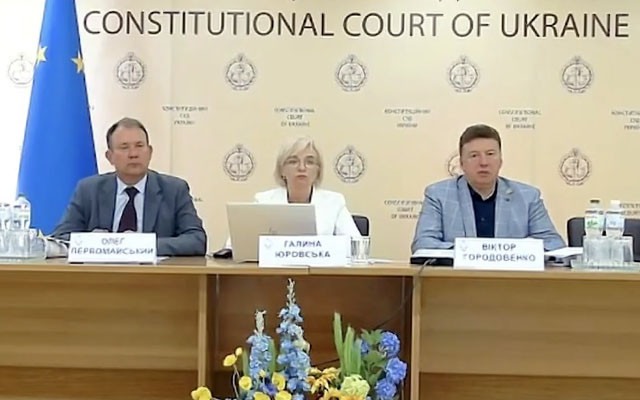
The special constitutional status of advocacy as an independent self-governing institution means that its acts are binding only on advocates and are not equivalent to normative legal acts of general application that require official publication.
On September 18, the Constitutional Court of Ukraine held a discussion on the publication of acts of bar self-government bodies in light of Decision No. 4-r(II)/2025 of 10.09.2025 in the case of a constitutional complaint by Vyacheslav Pleskach regarding the constitutionality of part three of Article 57 of the Law «On advocacy and the practice of law».
According to this provision, decisions of bar self-government bodies take effect on the date of their adoption, unless another term is provided for in the decisions. The complaint alleged that this provision contradicts Article 57 of the Constitution (regulatory legal acts defining the rights and obligations of citizens must be brought to the attention of the population in the manner prescribed by law, otherwise they are invalid), as it allows decisions of the Bar Council of Ukraine to take effect immediately upon their adoption. This violates the constitutional right of everyone to know their rights and obligations.
During the event, the judges of the Constitutional Court presented their vision of the role of advocacy, which was key to understanding the decision.
In particular, Galina Yurovska recalled that after the amendments to the Constitution, advocacy was included in the section «Justice» alongside the courts and the prosecutor's office. This means that advocacy is not an external institution, but an integral part of the mechanism for ensuring justice. The judge also drew attention to the guarantee of the independence of advocacy. «After the changes that took place in 2016, the section «Justice» brought together the prosecutor's office, the courts, and advocacy. They are components of this mechanism, which allows citizens to protect their rights and exercise them through the courts, - noted G. Yurovska. - The advocacy operates in Ukraine to provide professional legal assistance. This is a direct provision of the Constitution. The Constitution also directly stipulates that the independence of the advocacy is guaranteed».
According to the relevant law, bar self-government is the state-guaranteed right of advocates to independently decide on the organization of advocacy's activities in accordance with the procedure established by law. «We talked about the fact that the independence of advocacy is protected by the Constitution. This is a constitutional requirement. And therefore, it is precisely in order to implement this independence that advocates decide on issues of their internal activities, - the judge emphasized. - Advocacy is a non-governmental, self-governing institution that provides defense, representation, and other types of legal assistance on a professional basis and also independently decides on issues related to the organization of advocacy's activities. Advocacy consists of all advocates in Ukraine who are authorized to practice law».
Viktor Gorodovenko joined his colleague's position, bringing the discussion into a broader European context. He recalled Article 59 of the Constitution and the positive obligation of the state to guarantee access to legal aid. «The state guarantees the participation of an advocate in the provision of professional legal aid precisely in order to ensure effective access to justice. This wording, following the constitutional changes of 2016, reflects the content, form, and direction of the advocacy's activities», - noted the Constitutional Court judge.
He referred to the position of the Council of Europe, emphasizing that without an independent advocacy, effective justice is impossible. Therefore, the independence of the profession is not just a declaration, but a fundamental condition for its self-governance. «The Consultative Council of European Judges (CCJE - an advisory body to the Committee of Ministers of the Council of Europe, ed.) adopted two fairly serious conclusions even before the 2016 constitutional changes, which combined European experience and achievements regarding the role of prosecutors and lawyers in the implementation of the rule of law, - said the judge. - Without these extremely important institutions, it is impossible to imagine high-quality, effective, rule of law-based administration of justice».
The reporting judge in the case, Oleg Pervomaisky described Constitutional Court Decision No. 4-r(II)/2025 as the first since the 2016 constitutional changes that directly concerns advocacy and supplements constitutional doctrine. He also emphasized that advocacy is a self-governing body independent of the state, and its decisions can be both individual and normative in nature, but they operate exclusively within the professional community. In his opinion, this is what distinguishes them from normative legal acts of general application, which affect the rights of all citizens. «There is an independent body of advocate self-government that is not under the state. The legislator has proposed a certain model of access for advocates (who are professionals in terms of jurisprudence) to acts adopted by their own self-government bodies, which these advocates elect», - explained O. Pervomaisky.
He also drew attention to the presumption of constitutionality of laws: parliament is not an «enemy of the Constitution» but adopts acts for its development. At the same time, the Constitutional Court must take into account the criticism of the complainants in order to ensure a high-quality constitutional analysis. In this case, according to him, it was important to find a balance between compliance with the requirements of the Basic Law and the independence of bar self-government bodies in resolving internal issues.
Therefore, all elements formed a single line: the special constitutional status of advocacy determines the legal answer to the question raised in the constitutional complaint. The acts of the Bar Council of Ukraine cannot be considered normative legal acts of general application, as they regulate only internal relations within the profession. Therefore, the requirements for the official publication of acts establishing the rights and obligations of citizens do not apply to them.
The Constitutional Court ultimately confirmed that Part 3 of Article 57 of the Law «On advocacy and the practice of law» complies with the Basic Law. This decision is final and binding. And, as the discussion of this decision showed, it must be understood precisely through the recognition of the special status of advocacy.
Popular news
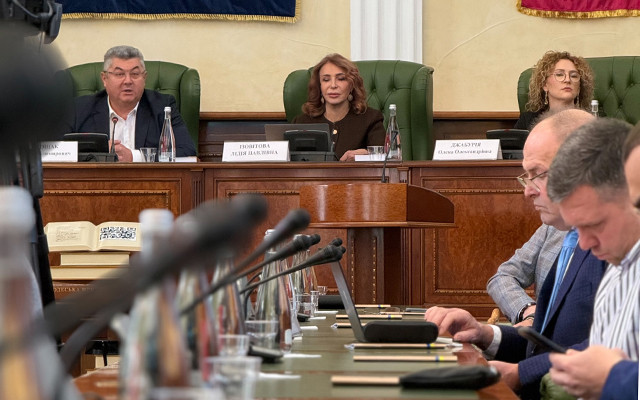
Guarantees of the practice of law
L. Izovitova: today advocacy maintains its independence and fights for guarantees for the profession
The Ukrainian advocacy remains an independent, constitutionally recognized institution of justice, which, in the conditions of war, has not only retained its subjectivity, but also consistently fights for guarantees to protect the profession.
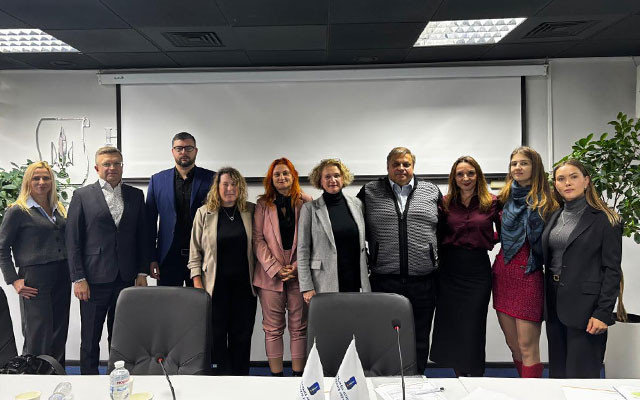
Discussion
Urban Planning Code: what should the new rules for rebuilding Ukraine be?
Does Ukraine need separate codification in the field of urban planning, which model of law to choose, and how to ensure a balance between the interests of the state, communities, businesses, and citizens in the context of post-war reconstruction?
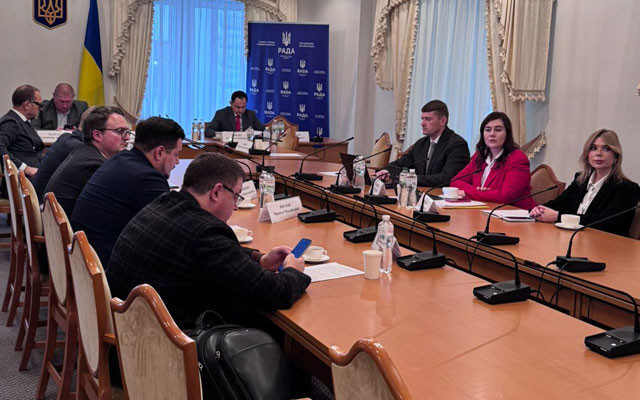
Guarantees of the practice of law
The Verkhovna Rada took another step towards ratifying the Convention on the protection of the profession of advocate
On November 5, the Verkhovna Rada held a working meeting dedicated to the translation of the Council of Europe Convention on the protection of the profession of advocate for its subsequent signing and ratification. The issue was initiated by the Ministry of Foreign Affairs, which drew attention to the key term «lawyer» in the international treaty.
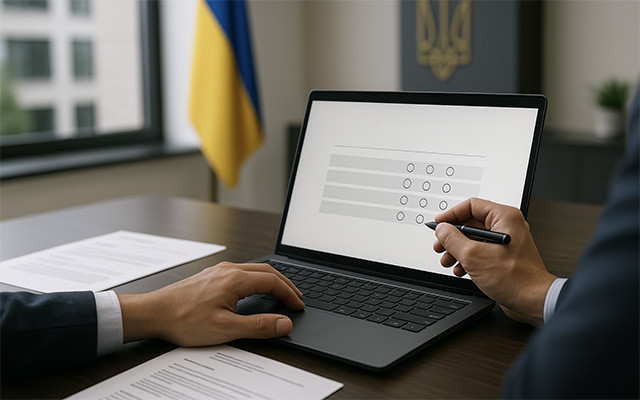
Interaction
NACB is looking for corruption risks in its activities. Advocates are asked to help
The National Anti-Corruption Bureau of Ukraine has launched a survey aimed at gathering information to identify corruption risks in the activities of the National Bureau and prepare an Anti-Corruption Program for 2026–2028.
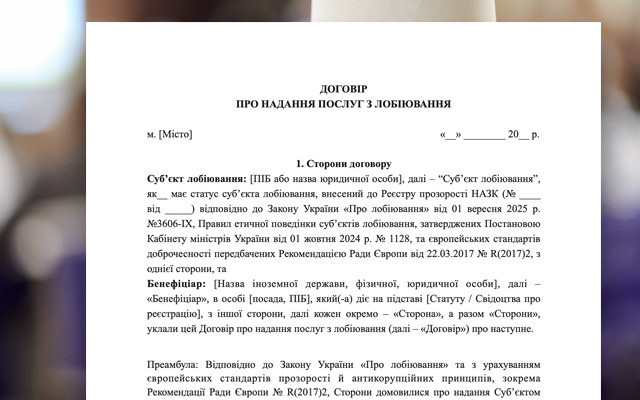
Interaction
Agreement on the provision of lobbying services: a template for advocates has been developed by the UNBA
The Ukrainian National Bar Association has prepared a model agreement for the provision of lobbying services that complies with the requirements of the relevant law and takes into account the specific features of such activities carried out by persons providing legal assistance.
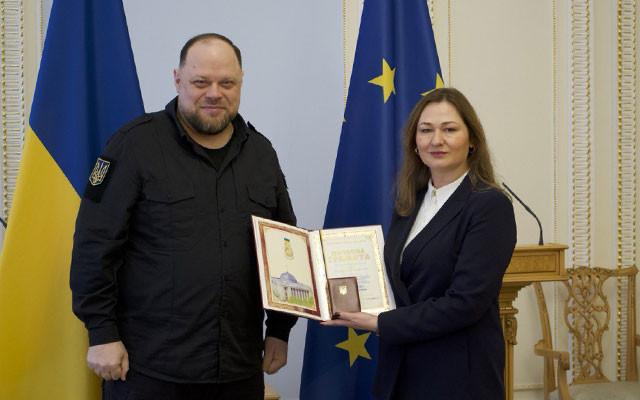
Greetings
Nana Bakayanova awarded with the Certificate of honor of the Verkhovna Rada of Ukraine
Nana Bakayanova, head of the Department of judicial, law enforcement and advocacy organizations at the Odessa Law Academy and secretary of the disciplinary chamber of the Odessa Region Qualification and Disciplinary Commission, received a Certificate of honor from the Verkhovna Rada of Ukraine.
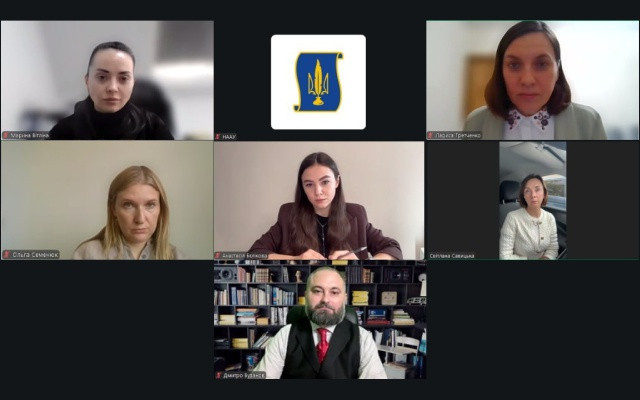
Discussion
Law and feelings: advocates explore contemporary challenges in family law
Marriage and divorce are not only legal procedures, but also social phenomena that require a responsible approach. The UNBA Committee on family law organized and held a professional discussion on the topic «Conscious» marriage and «prudent» divorce: challenges, risks, consequences».

Practice of law
BCU strengthens its position on the right of advocate to prioritize cases
In legal practice, it is not uncommon for court hearings in different cases to be scheduled at the same time. This raises the question: which case should the advocate attend first, and can the court interfere with this decision?
Publications

Censor.net Protecting advocates – protecting justice: addressing concerns about the new law

Ihor Kolesnykov A BRIEF SUMMARY REGARDING THE APPLICATION OF THE ORDER ON EXTENDED CONFISCATION IN LATVIA REGARDING FINANCIAL ASSETS OF…

Valentyn Gvozdiy WORKING IN A WAR ZONE

Lydia Izovitova Formula of perfection

Sergiy Vylkov Our judicial system is so built that courts do not trust advocates

Iryna Vasylyk Advocacy in the proclamation of Independence of Ukraine

Oleksandr DULSKY When we cross the border of the Supreme Anti-Corruption Court, we get into another department of the National Anti-Corruption…

Vadym Krasnyk The UNBA will work, and all obstacles and restrictions are only temporary inconveniences
